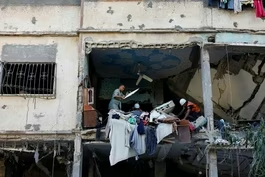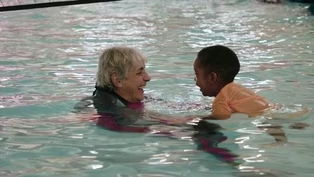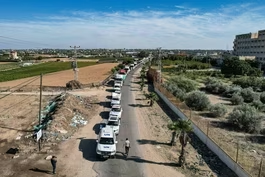
Advice for talking with kids about the Israel-Hamas war
Clip: 10/21/2023 | 6m 12sVideo has Closed Captions
A child psychologist’s advice for talking with kids about the Israel-Hamas war
Since the start of the Israel-Hamas war, news and social media have been filled with horrific images and stories of civilians killed, wounded and taken hostage. This information can be especially tough for kids to digest. Duke University child psychologist Robin Gurwitch joins Yasmeen Alamiri to discuss how adults can talk about this difficult issue with kids.
Problems playing video? | Closed Captioning Feedback
Problems playing video? | Closed Captioning Feedback
Major corporate funding for the PBS News Hour is provided by BDO, BNSF, Consumer Cellular, American Cruise Lines, and Raymond James. Funding for the PBS NewsHour Weekend is provided by...

Advice for talking with kids about the Israel-Hamas war
Clip: 10/21/2023 | 6m 12sVideo has Closed Captions
Since the start of the Israel-Hamas war, news and social media have been filled with horrific images and stories of civilians killed, wounded and taken hostage. This information can be especially tough for kids to digest. Duke University child psychologist Robin Gurwitch joins Yasmeen Alamiri to discuss how adults can talk about this difficult issue with kids.
Problems playing video? | Closed Captioning Feedback
How to Watch PBS News Hour
PBS News Hour is available to stream on pbs.org and the free PBS App, available on iPhone, Apple TV, Android TV, Android smartphones, Amazon Fire TV, Amazon Fire Tablet, Roku, Samsung Smart TV, and Vizio.
Providing Support for PBS.org
Learn Moreabout PBS online sponsorshipLISA DESJARDINS: Since the war between Hamas and Israel began, news and social media have been filled with horrific images, stories of civilians killed, and hostage takings.
This information can be tough to digest for adults, but it can be especially difficult for kids news, our digital senior editor Yasmeen Alamiri looks into how and whether to talk to kids about this.
She spoke with Duke University child psychologist Robin Gurwitch.
YASMEEN ALAMIRI: Dr. Gurwitch, thank you so much for joining me.
ROBIN GURWITCH, Duke University: Thank you for having me, Yasmeen.
YASMEEN ALAMIRI: So let's start with the most basic thing.
Do we talk to our kids about the war at all?
And if so, when or how do we bring it up?
ROBIN GURWITCH: So to answer your first question, absolutely positively yes.
When we don't talk about difficult things children may not bring it up because they're worried they're going to upset you.
And all of the science tells us if adults will bring it up, they have a better chance of helping children cope with what's going on, take a deep breath in, jump in to that conversation, you can start as simply as there's a war going on in Israel and Gaza.
Tell me what you know.
YASMEEN ALAMIRI: What are the top three things that we should keep in mind or parents should keep in mind when approaching this conversation?
ROBIN GURWITCH: One would be to make sure that we as adults are in a good place to have the conversation.
We've got our emotions in check, we can have these conversations in a way that doesn't scare them or make them more anxious.
I think the second one is to answer the questions that they have, honestly, openly at a level that is at their developmental age.
And I think, thirdly, is to recognize this is not the only conversation on the topic you're going to have, this is the first and it will be important for you to circle back around in the days and months ahead.
YASMEEN ALAMIRI: As he pointed out, age is a huge component of all of this, and it makes a difference in how we approach the conversation.
So how would we speak to younger kids versus say teenagers about this?
ROBIN GURWITCH: With younger children, one of the things they're really asking about is am I safe?
And are you safe, it is okay to tell them there are many people that are hurt.
And there are some people that have died.
And we feel very sad and bad about that.
But it is equally important not to go into gruesome details, that is not important.
As children get older, they understand more nuances.
They understand that there aren't black and white answers to everything.
With teenagers sometimes we may get more by saying tell me what your friends are saying about all of this, I may share with you, my friends say.
And as caregivers, as parents, we know that they are really telling us what they're talking about with their friends and how they're thinking and what they're feeling.
YASMEEN ALAMIRI: A lot of kids are seeing this content on social media where parents have little to no control.
How do we help them deal with the unexpectedly traumatic things that they may come across in their feeds?
ROBIN GURWITCH: Check in, ask them what they're watching.
Look at it, if there are parental controls, particularly with school aged children, put those on, we know that there's quite a bit on social media right now, that is not appropriate for anyone, anybody to be watching right now, take a break from social media, turn it off, about an hour before you go to bed because sleep is often disrupted.
And if we're trying to go to sleep with images and stories of the horror that's happening right now of this sadness of the tragedy, it is going to interfere with our sleep.
YASMEEN ALAMIRI: We know unfortunately, that antisemitism and Islamophobia are on the rise in this country.
And we also know that this is playing out between children on the playground and in schools.
How do we help kids cope with being stereotyped or if they're being bullied?
ROBIN GURWITCH: I think it is important for us as adults, when we have a difficult conversation, to also help them identify.
If you ever feel like somebody is making you uncomfortable.
If they're doing or saying anything to you, please let's think about who you would tell what you would say.
I think it is also important to help them consider if you see something, what are your responsibilities?
What should you do?
And it's not necessarily that you need to intervene as much as tell somebody or to support someone.
YASMEEN ALAMIRI: How often should we be having these conversations?
When is it not enough and when is it just sometimes too much?
ROBIN GURWITCH: parents and caregivers know their children better than anyone else.
So if you are seeing that they are having a hard time with sleeping, if their behaviors are changing, maybe they are having more meltdowns or more irritability, if they're struggling with learning in school, those are usually signs that they're more anxious, more worried, more concerned, to continue to have those conversations.
When they bring it up, sit down and answer it truly don't say let's talk about it later.
Take that window.
If they ask then stop whatever you're doing and say thank you for bringing that up.
Let's sit down and talk about it.
And particularly for school age or even a little bit younger children.
Don't be surprised if they ask you the same question over and over and over again.
It's not that they're wanting different answers.
They're just is trying to process the answer that you continue to give them.
YASMEEN ALAMIRI: Dr. Gurwitch, thank you so much for joining us.
Aid arrives in Gaza as Israel prepares to step up attacks
Video has Closed Captions
Clip: 10/21/2023 | 3m 53s | Humanitarian relief arrives in Gaza as Israel prepares to step up attacks (3m 53s)
Swim safety advocates aim to undo historic racial inequities
Video has Closed Captions
Clip: 10/21/2023 | 4m 49s | Swim safety advocates aim to overcome historic racial inequities (4m 49s)
UN aid chief hopes to increase flow of supplies to Gaza
Video has Closed Captions
Clip: 10/21/2023 | 6m 46s | UN aid chief hopes to increase flow of critical supplies to Gaza (6m 46s)
Providing Support for PBS.org
Learn Moreabout PBS online sponsorship
- News and Public Affairs

FRONTLINE is investigative journalism that questions, explains and changes our world.

- News and Public Affairs

Amanpour and Company features conversations with leaders and decision makers.












Support for PBS provided by:
Major corporate funding for the PBS News Hour is provided by BDO, BNSF, Consumer Cellular, American Cruise Lines, and Raymond James. Funding for the PBS NewsHour Weekend is provided by...


